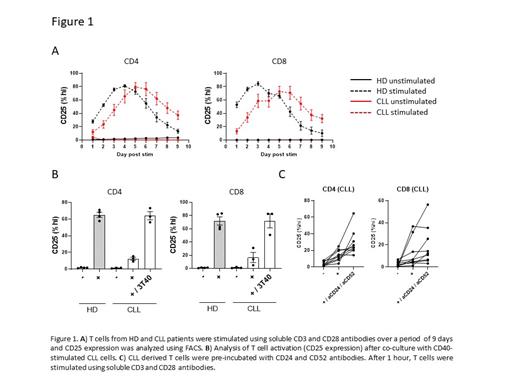Abstract
Introduction
Success rates of autologous T cell-based therapies, such as CAR-T cell therapy, in chronic lymphocytic leukemia (CLL) have been suboptimal and correlate with failure of activation and proliferation of T cells in vitro and in vivo. Previous data showing that impaired CD8 T-cell activation, proliferation and metabolic reprogramming could be restored by purifying CLL T cells via cell-sorting (van Bruggen et al., Blood, 2019) indicating that an as yet unknown, CLL-derived factor is responsible for acquired T-cell dysfunction. In this study we aim to elucidate the mechanistic basis of CLL-mediated T-cell dysfunction.
Results
Dynamic analysis of αCD3/CD28 stimulated autologous T cells in presence of CLL cells over a period of 9 days revealed that T-cell activation (CD25, CD71, CD95 and PD-1) in CLL is in fact not impaired but occurs in a delayed fashion. CLL T cells reached peak activation after 5-6 days in contrast to 2-3 days for age-matched healthy donors. (Fig. 1A). This delayed T cell receptor-induced T cell activation was largely normalized with tumor cell depletion by flow-sorting prior to activation. Accordingly, in absence versus presence of autologous CLL cells, CAR-T cells derived from CLL patients showed enhanced proliferation, cytokine production and cytotoxicity, indicating potential clinical relevance. These findings show that T cells in CLL are not (terminally) exhausted but that a CLL-derived factor interferes with proper T-cell activation, leading to a delay in activation and impaired proliferation and cytotoxicity. We attempted to identify the mechanism of action in which CLL cells induce T cell dysfunction and whether these suppressive effects are mediated through a soluble factor secreted by CLL cells or by contact-dependent mechanisms.
Previous studies have shown that CD40 activation of CLL cells results in increased expression of key surface-expressed adhesion and costimulatory molecules, but also in alterations of immune-modulatory cytokines secretion. This model was therefore used to decipher mechanisms of CLL-mediated T cell dysfunction. CD40-activation of CLL cells resulted in improved T-cell activation and proliferation upon αCD3/CD28 stimulation in a contact-dependent manner (based on trans-well experiments; Fig. 1B ).
Several clinically approved kinase inhibitors were tested to identify signaling cascades involved in CD40-mediated alleviation of T-cell dysfunction. Only pre-treatment of CLL cells with the SRC-inhibitor dasatinib (100nM) abrogated the enhanced T-cell activation induced by CD40-activated CLL cells. Additional control experiments excluded direct effects of dasatinib on T cell function. Dasatinib did not reduce expression of co-stimulatory markers on CD40-activated CLL cells, indicating that lack of co-stimulation was not the sole explanation for CLL-mediated T cell dysfunction. RNA sequencing of CD40-stimulated CLL cells treated with or without dasatinib and filtered for membrane-bound factors revealed the Sialic acid-binding Ig-like lectin 10 (Siglec-10) ligands CD24 and CD52 as potential candidates responsible for inhibiting T-cell function in CLL, which we confirmed at the protein level. We also found increased expression of Siglec-10 on CLL T cells, suggesting a role for Siglec-10 ligation in inhibition of the TCR signaling cascade. Indeed, inhibition of Siglec-10 ligation by blocking CD24, and CD52 antibodies subsequently improved T-cell activation despite presence of CLL cells (Fig. 1C).
Conclusion
These results demonstrate that T cells derived from CLL patients are not terminally dysfunctional and can be revived. Our observations indicate that CLL cells actively suppress (CAR) T-cell function in a contact-dependent fashion through CD24- and CD52-mediated Siglec-10 ligation. These proteins might represent targets for therapeutic intervention aimed at enhancing T-cell function in CLL.
Kater: Genmab, LAVA: Other: Ad Board, Steering Committee; Abbvie: Honoraria, Other: Ad Board, Research Funding; Janssen, AstraZeneca: Other: Ad Board, steering committee, Research Funding; BMS, Roche/Genentech: Other: Ad Board, , Research Funding.


This feature is available to Subscribers Only
Sign In or Create an Account Close Modal